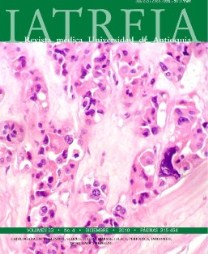Is inadequate response to pathogens and other aggressors due to vitamin A deficiency?
DOI:
https://doi.org/10.17533/udea.iatreia.11143Abstract
Vitamin A plays a pivotal role in tissue and organ development due to its ability to regulate cellular differentiation and apoptosis. Moreover, this vitamin produces very important effects on specific components of innate and adaptative immune responses. Concerning the innate immune system, retinoic acid (RA) participates in the regeneration of mucosal surfaces and epithelia, also promoting neutrophil and eosinophil differentiation and enhancing phagocytosis. Additionally, vitamin A supports the production of extracellular matrix metalloproteinases enhancing the migration of different immune cells to effector sites. On the other hand, although the effects of vitamina A in the function of NK cells are more controversial, it is known that blood NK cell numbers and function are diminished during vitamin A deficiency (VAD). In adaptive immunity, RA influences the production of cytokines by antigen presenting cells, in turn, affecting the differentiation of naïve T lymphocytes into different T helper cell subpopulations. Overall, it has been established that RA increases T cell proliferation and enhances the development of plasma cell from mature B lymphocytes. Therefore, vitamin A is essential to promote suitable immune responses against pathogens, especially in children who are commonly affected by VAD not only in Colombia, but also in approximately 60 countries worldwide.
Downloads
Downloads
Published
How to Cite
Issue
Section
License
Papers published in the journal are available for use under the Creative Commons license, specifically Attribution-NonCommercial-ShareAlike 4.0 International.
The papers must be unpublished and sent exclusively to the Journal Iatreia; the author uploading the contribution is required to submit two fully completed formats: article submission and authorship responsibility.














